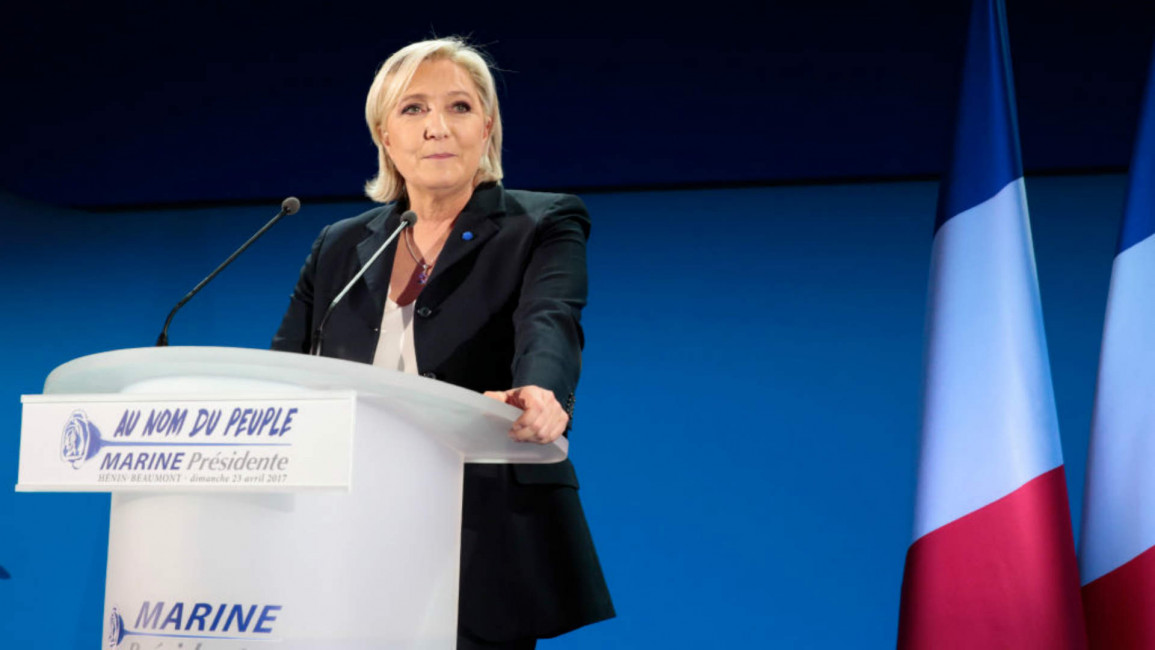
Marine Le Pen: France's homegrown threat to democracy
Fascism once again threatens the Republic - this time it comes not in the form of jackbooted Nazis, but rather in the homegrown threat of Marine Le Pen, member and erstwhile leader of the fascist Front National (FN).
Nor this time does the fascist threat to France come from external invasion and the crushing of French liberal democracy from foreign forces, but rather from within the French democracy and society itself. By Sunday 7 May, France will have either voted for a fascist or a social democratic centrist to be their next president.
The dividing line between Emmanuel Macron and Le Pen is one between anti-fascism and fascism, with Muslims, as with all European fascist parties and movements, being the focus of Le Pen's fascist crusade.
Whenever the question of the "radicalisation" of Muslims within western societies comes up, politicians and the media invariably turn towards something called "the Muslim community", which they'll either reprimand, sanction or seek answers from. The dominant line is that "radicalism" occurs due to the "lack of integration" of Muslim communities into the rest of society and a conflict of "values".
This narrative, which one might say engenders a form of collective blame, is even more explicitly accepted by the mainstream of politics of France. For example, it wasn't a fascist, but rather the current socialist president Francois Hollande who wrote in 2016 that "it's true there is a problem with Islam … because Islam demands recognition … it wants to assert itself on the Republic… what becomes a problem is if Muslims don't criticise acts of radicalisation, if imams behave in an anti-Republican way."
| Read more: Le Pen adviser fined for inciting hatred towards Muslims | |
Hollande went on to write that Muslim women who wear the veil (niqab) were not French, saying they could become "Marianne" (the feminine goddess symbol of the enlightenment values of "liberty" and "reason" that allegedly define the French Republic). If they accepted French values - he claims - they would "liberate [themselves] from the veil" and "become French women", preferring "freedom to subservience".
To reiterate – these are the words of the current French president, an alleged progressive and socialist, not the words of a fascist, but they certainly provide an insight into why France once again has a fascist, the candidate of a party that was once openly Neo-Nazi, within touching distance of power, receiving 7.6 million votes.
If the dominant narrative around "radicalisation" of Muslims is that the problem is communal, can we not apply the same thing to fascism? Why is it that millions of predominantly white Christian French people are willing to vote for an Islamophobic fascist and extremist? Muslims could rightfully ask "why do they hate us?"
 |
Muslims could rightfully ask "why do they hate us?" |  |
One might point to the rise of the Islamic State group (IS), the criminal sympathisers of which have carried out several attacks on France in recent years, as the main reason why Le Pen has risen so exponentially. This of course misses that the turn towards fascism predates such attacks - it's part of a narrative where even Islamophobic fascism is ultimately seen as being a product of the very existence of Muslims within non-Muslim-majority countries.
Even if you make the broader point that Islamophobia is a result of the "conflict" that erupted between "radical Islam" and the West after 9/11, you must qualify this with the fact that such hatred has been historically and immediately manufactured.
The phenomenon of Islamophobia in France has at its root not in the failure of Muslims to integrate, but rather the failure of great sections of French society to accept French Muslims into society - resistance to integration. It's this resistance that causes the kind of societal problems that are interpreted or deliberately packaged as being evident of the "failure" of Muslims to "integrate".
 |
Islamophobia in France has at its root not in the failure of Muslims to integrate, but rather the failure of great sections of French society to accept French Muslims |  |
This occurs both institutionally and on a personal level, through the widespread discrimination that Muslims face in the employment market, or in terms of racial profiling. And all of these things are interrelated - discrimination births poverty, poverty births crime, including "jihadist" crime, which in turn produces more official and unofficial discrimination.
Nobody denies that religious extremsim gains some currency among Muslims who face economic marginalisation - the fascists - to use an ancient racist trope - would have you believe that the economic marginalisation is due to them being parasitical to the nation, and that "radicalism" is due to the inherent evil of Islam.
However, a Le Pen victory would be a dream come true for IS. It was the progenitor of the group, Abu Musab al-Zarqawi, who once wrote that his tactic for bringing Muslims towards his fascistic vision of Islam was to "awaken these inattentive Sunnis as they feel imminent danger and annihilating death".
| Read more: France's elephant in the room: A brutal, cinematic reminder | |
Le Pen might not bring annihilating death, but with her hardcore Islamophobia, she would bring "imminent danger" to Muslims who already face large-scale discrimination and thus increase the likelihood of some of them embracing the worldview of IS.
All of this is intricately intertwined with other forms of racism - Islamophobia, as a general phenomenon, is simply the distinct manifestation of the way the West has dealt with the increased immigration of Muslims. In this sense, it intersects with much older and deeper rooted forms of prejudice that result from white supremacy and cultural chauvinism.
Take, for example, the hugely controversial subject of the allegedly satirical magazine Charlie Hebdo, which was infamously targeted for a brutal and deadly assault by criminals inspired by al-Qaeda. It's not much of a leap to see in its crude, racist caricatures of crooked-nosed feckless, sexually perverse Arabs, the kind of racist depictions you would've found of black Africans in the 1950s, or, even more aptly, of Jews prior to the Holocaust.
Much of this kind of racism is rooted in France's colonial past and its failure to come to terms with the massive criminality of its colonial past - Islamophobia in France is rooted immediately in its recent history, with the Algerian war of independence, during which at least one million Algerians were murdered by France.
 |
Macron has put clear space between himself and Le Pen, with him rejecting Le Pen's attempt to stoke up Islamophobia |  |
But the extent to which this history has been deliberately overlooked within France is extraordinary. Indeed, during the current presidential campaign, Le Pen characteristically appealed to such denialism by stating that "French colonisation gave a lot to former colonies, especially Algeria", as well as going on to say that French colonialism was the reason Algeria has "hospitals, roads and schools".
This is the particularly squalid cavity from which Le Pen and the Front National have emerged - from the wider trend within French society to see Muslims as enemy aliens (as well as immigrants in general) merely because they are Muslims, to excuse the crimes of the Nazi-collaborators of the Vichy regime as they sent 13,000 Jews to their deaths, to see racist French colonialism as being a source of national pride and, as with Brexit and Trump, to envision a nativist awakening as the answer to her country's ills.
Le Pen likes to hide behind "secularism", but she has played up the idea of her as a saviour of "Christian civilisation" against the Islamic hordes very skilfully, with her supporters cultivating an image of her as a modern Joan of Arc (her party hold a rally every year on 1 May commemorating Joan of Arc).
Her opponent Macron, on the other hand, condemned French colonialism in Algeria as "crimes against humanity". And this is one of the truly positive developments. For too long centrists have stoked and exploited Islamophobia for their own gain, or they've reacted to the rise of Islamophobic fascism by attempting to emulate and co-opt it - Macron has crucially bucked this trend. He has put clear space between himself and Le Pen, with him rejecting Le Pen's attempt to stoke up Islamophobia.
While some would have you believe the choice in Sunday's election is between two establishment candidates who are just as bad as each other, the choice is one between fascism and a more self-aware, progressive form of centrism – a centrism that begins to reckon with the liberal Islamophobia that gives Le Pen currency.
Macron, as with every other politician is not perfect, but the dichotomy between the centre and the fascist right in France is simply a microcosm for the struggles yet to come in much of Europe - for the struggle of Muslims, immigrants, refugees and minorities against those who think of them as less than human.
It's of the utmost importance that he, and his politics of protecting the liberties of the status quo from a fascist threat, triumph.
Sam Hamad is an independent Scottish-Egyptian activist and writer.
Opinions expressed in this article remain those of the author and do not necessarily represent those of The New Arab, its editorial board or staff.




